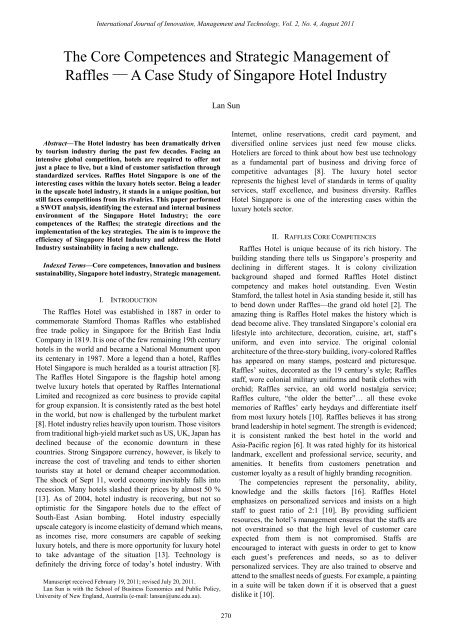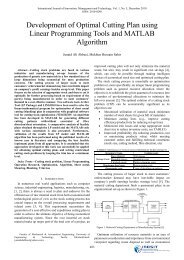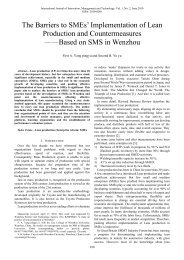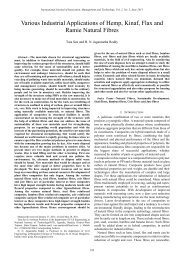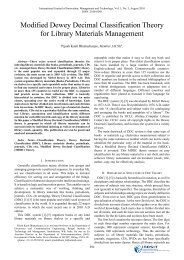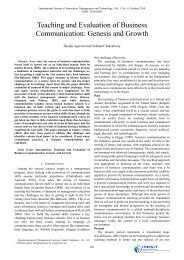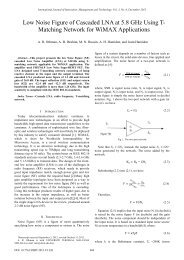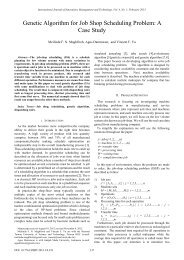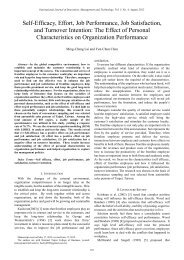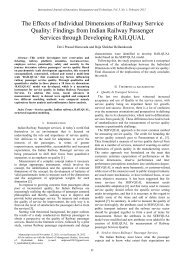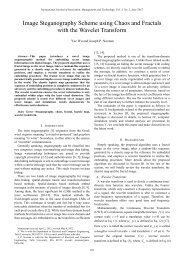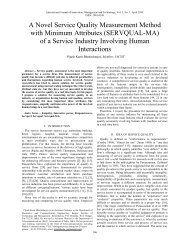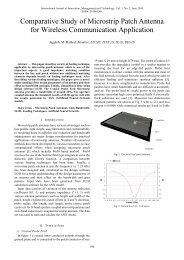The Core Competences and Strategic Management of Raffles ... - ijimt
The Core Competences and Strategic Management of Raffles ... - ijimt
The Core Competences and Strategic Management of Raffles ... - ijimt
Create successful ePaper yourself
Turn your PDF publications into a flip-book with our unique Google optimized e-Paper software.
International Journal <strong>of</strong> Innovation, <strong>Management</strong> <strong>and</strong> Technology, Vol. 2, No. 4, August 2011<br />
<strong>The</strong> <strong>Core</strong> <strong>Competences</strong> <strong>and</strong> <strong>Strategic</strong> <strong>Management</strong> <strong>of</strong><br />
<strong>Raffles</strong> — A Case Study <strong>of</strong> Singapore Hotel Industry<br />
Lan Sun<br />
Abstract—<strong>The</strong> Hotel industry has been dramatically driven<br />
by tourism industry during the past few decades. Facing an<br />
intensive global competition, hotels are required to <strong>of</strong>fer not<br />
just a place to live, but a kind <strong>of</strong> customer satisfaction through<br />
st<strong>and</strong>ardized services. <strong>Raffles</strong> Hotel Singapore is one <strong>of</strong> the<br />
interesting cases within the luxury hotels sector. Being a leader<br />
in the upscale hotel industry, it st<strong>and</strong>s in a unique position, but<br />
still faces competitions from its rivalries. This paper performed<br />
a SWOT analysis, identifying the external <strong>and</strong> internal business<br />
environment <strong>of</strong> the Singapore Hotel Industry; the core<br />
competences <strong>of</strong> the <strong>Raffles</strong>; the strategic directions <strong>and</strong> the<br />
implementation <strong>of</strong> the key strategies. <strong>The</strong> aim is to improve the<br />
efficiency <strong>of</strong> Singapore Hotel Industry <strong>and</strong> address the Hotel<br />
Industry sustainability in facing a new challenge.<br />
Indexed Terms—<strong>Core</strong> competences, Innovation <strong>and</strong> business<br />
sustainability, Singapore hotel industry, <strong>Strategic</strong> management.<br />
I. INTRODUCTION<br />
<strong>The</strong> <strong>Raffles</strong> Hotel was established in 1887 in order to<br />
commemorate Stamford Thomas <strong>Raffles</strong> who established<br />
free trade policy in Singapore for the British East India<br />
Company in 1819. It is one <strong>of</strong> the few remaining 19th century<br />
hotels in the world <strong>and</strong> became a National Monument upon<br />
its centenary in 1987. More a legend than a hotel, <strong>Raffles</strong><br />
Hotel Singapore is much heralded as a tourist attraction [8].<br />
<strong>The</strong> <strong>Raffles</strong> Hotel Singapore is the flagship hotel among<br />
twelve luxury hotels that operated by <strong>Raffles</strong> International<br />
Limited <strong>and</strong> recognized as core business to provide capital<br />
for group expansion. It is consistently rated as the best hotel<br />
in the world, but now is challenged by the turbulent market<br />
[8]. Hotel industry relies heavily upon tourism. Those visitors<br />
from traditional high-yield market such as US, UK, Japan has<br />
declined because <strong>of</strong> the economic downturn in these<br />
countries. Strong Singapore currency, however, is likely to<br />
increase the cost <strong>of</strong> traveling <strong>and</strong> tends to either shorten<br />
tourists stay at hotel or dem<strong>and</strong> cheaper accommodation.<br />
<strong>The</strong> shock <strong>of</strong> Sept 11, world economy inevitably falls into<br />
recession. Many hotels slashed their prices by almost 50 %<br />
[13]. As <strong>of</strong> 2004, hotel industry is recovering, but not so<br />
optimistic for the Singapore hotels due to the effect <strong>of</strong><br />
South-East Asian bombing. Hotel industry especially<br />
upscale category is income elasticity <strong>of</strong> dem<strong>and</strong> which means,<br />
as incomes rise, more consumers are capable <strong>of</strong> seeking<br />
luxury hotels, <strong>and</strong> there is more opportunity for luxury hotel<br />
to take advantage <strong>of</strong> the situation [13]. Technology is<br />
definitely the driving force <strong>of</strong> today’s hotel industry. With<br />
Manuscript received February 19, 2011; revised July 20, 2011.<br />
Lan Sun is with the School <strong>of</strong> Business Economics <strong>and</strong> Public Policy,<br />
University <strong>of</strong> New Engl<strong>and</strong>, Australia (e-mail: lansun@une.edu.au).<br />
Internet, online reservations, credit card payment, <strong>and</strong><br />
diversified online services just need few mouse clicks.<br />
Hoteliers are forced to think about how best use technology<br />
as a fundamental part <strong>of</strong> business <strong>and</strong> driving force <strong>of</strong><br />
competitive advantages [8]. <strong>The</strong> luxury hotel sector<br />
represents the highest level <strong>of</strong> st<strong>and</strong>ards in terms <strong>of</strong> quality<br />
services, staff excellence, <strong>and</strong> business diversity. <strong>Raffles</strong><br />
Hotel Singapore is one <strong>of</strong> the interesting cases within the<br />
luxury hotels sector.<br />
II. RAFFLES CORE COMPETENCES<br />
<strong>Raffles</strong> Hotel is unique because <strong>of</strong> its rich history. <strong>The</strong><br />
building st<strong>and</strong>ing there tells us Singapore’s prosperity <strong>and</strong><br />
declining in different stages. It is colony civilization<br />
background shaped <strong>and</strong> formed <strong>Raffles</strong> Hotel distinct<br />
competency <strong>and</strong> makes hotel outst<strong>and</strong>ing. Even Westin<br />
Stamford, the tallest hotel in Asia st<strong>and</strong>ing beside it, still has<br />
to bend down under <strong>Raffles</strong>—the gr<strong>and</strong> old hotel [2]. <strong>The</strong><br />
amazing thing is <strong>Raffles</strong> Hotel makes the history which is<br />
dead become alive. <strong>The</strong>y translated Singapore’s colonial era<br />
lifestyle into architecture, decoration, cuisine, art, staff’s<br />
uniform, <strong>and</strong> even into service. <strong>The</strong> original colonial<br />
architecture <strong>of</strong> the three-story building, ivory-colored <strong>Raffles</strong><br />
has appeared on many stamps, postcard <strong>and</strong> picturesque.<br />
<strong>Raffles</strong>’ suites, decorated as the 19 century’s style; <strong>Raffles</strong><br />
staff, wore colonial military uniforms <strong>and</strong> batik clothes with<br />
orchid; <strong>Raffles</strong> service, an old world nostalgia service;<br />
<strong>Raffles</strong> culture, “the older the better”… all these evoke<br />
memories <strong>of</strong> <strong>Raffles</strong>’ early heydays <strong>and</strong> differentiate itself<br />
from most luxury hotels [10]. <strong>Raffles</strong> believes it has strong<br />
br<strong>and</strong> leadership in hotel segment. <strong>The</strong> strength is evidenced;<br />
it is consistent ranked the best hotel in the world <strong>and</strong><br />
Asia-Pacific region [6]. It was rated highly for its historical<br />
l<strong>and</strong>mark, excellent <strong>and</strong> pr<strong>of</strong>essional service, security, <strong>and</strong><br />
amenities. It benefits from customers penetration <strong>and</strong><br />
customer loyalty as a result <strong>of</strong> highly br<strong>and</strong>ing recognition.<br />
<strong>The</strong> competencies represent the personality, ability,<br />
knowledge <strong>and</strong> the skills factors [16]. <strong>Raffles</strong> Hotel<br />
emphasizes on personalized services <strong>and</strong> insists on a high<br />
staff to guest ratio <strong>of</strong> 2:1 [10]. By providing sufficient<br />
resources, the hotel’s management ensures that the staffs are<br />
not overstrained so that the high level <strong>of</strong> customer care<br />
expected from them is not compromised. Staffs are<br />
encouraged to interact with guests in order to get to know<br />
each guest’s preferences <strong>and</strong> needs, so as to deliver<br />
personalized services. <strong>The</strong>y are also trained to observe <strong>and</strong><br />
attend to the smallest needs <strong>of</strong> guests. For example, a painting<br />
in a suite will be taken down if it is observed that a guest<br />
dislike it [10].<br />
270
International Journal <strong>of</strong> Innovation, <strong>Management</strong> <strong>and</strong> Technology, Vol. 2, No. 4, August 2011<br />
TABLE I.<br />
Strengths<br />
• Top market presence<br />
• Well educated skilled Staff<br />
• High quality service<br />
• Strong facilities capacity<br />
Weaknesses<br />
• Challenge from price war<br />
• High labor turnover<br />
• Low motivation in service<br />
providing<br />
• <strong>Management</strong> control <strong>and</strong><br />
discipline<br />
• Old building constrains<br />
• Over rigid management<br />
Opportunities<br />
• Primary market from Asian<br />
Pacific Region<br />
Threats<br />
• Traditional tourists market<br />
declined<br />
• Emerging markets in China <strong>and</strong><br />
India<br />
• Internet-eHotel<br />
• Changing in customers’ needs<br />
for cheap hotels<br />
• Strong Singapore currency<br />
III. RAFFLES CORPORATE STRATEGIES<br />
According to [1], the hotel industry is a mature industry<br />
shows zero or little growth. <strong>The</strong> possibility for continued<br />
growth is diversification, utilizing existing capabilities <strong>and</strong><br />
competencies to allow hotel gain competitive advantage over<br />
substitutions, <strong>and</strong> thus attract new customers coming into the<br />
market.<br />
In 2001, <strong>Raffles</strong> holding acquired Swissotel <strong>and</strong><br />
diversified its br<strong>and</strong>ing to four star deluxe br<strong>and</strong>ing. This<br />
strategy is successful because <strong>Raffles</strong> Hotel picked the right<br />
point to start differentiation. Accordingly, differentiation<br />
strategy for service industry should be designed as late as<br />
possible in the value chain, it is most effective when delivery<br />
directly to the customers [17]. <strong>Raffles</strong> Hotel employed<br />
differentiation-based focused strategy targeting at upscale<br />
customers. This strategy is successful because the target<br />
market niche is wealthy enough to be pr<strong>of</strong>itable <strong>and</strong> <strong>of</strong>fers<br />
good growth potential. <strong>The</strong>y are extremely rich <strong>and</strong> will not<br />
consider other top-end hotels to be alternatives. <strong>The</strong>y are<br />
willing to pay a big price premium for the very finest items<br />
<strong>and</strong> top service available.<br />
<strong>The</strong> strategy is successful also because it picks a niche that<br />
is well suited to its resource strengths <strong>and</strong> capabilities.<br />
<strong>Raffles</strong>’ core competencies <strong>and</strong> unique capabilities in serving<br />
the target market niche provide the strongest <strong>and</strong> most<br />
dependable basis to against challengers, also act as an entry<br />
barrier to dissuade potential new entrants. Even if some niche<br />
customers have substantial bargaining leverage, their power<br />
is blunted somewhat by the downside <strong>of</strong> shifting to rival<br />
hotels which less capable to meet their expectations.<br />
But how long <strong>Raffles</strong> Hotel will sustain in this niche<br />
market? <strong>Raffles</strong> Holding realized group long term<br />
pr<strong>of</strong>itability shouldn’t rely solely on this small upscale group<br />
<strong>of</strong> customers that <strong>Raffles</strong> Hotel attracted. In particular, they<br />
launched a related-diversification strategy as corporate level<br />
strategy, <strong>and</strong> started to diversify its business to four star hotel<br />
business <strong>and</strong> hotel management business.<br />
IV. RAFFLES INNOVATION AND FUTURE SUSTAINABILITY<br />
<strong>Raffles</strong> Hotel has succeeded in formulating the strategies<br />
which fit them the most; however, several problems arise in<br />
implementing these strategies. Firstly, strategies are all about<br />
people. But <strong>Raffles</strong> HR finds difficult to attract <strong>and</strong> retain<br />
good staffs to support <strong>and</strong> complete designed strategic<br />
process. To make the job attractive, HR has signed a bonuses<br />
<strong>and</strong> incentive programs for those who work over one year. In<br />
2000, Group established the <strong>Raffles</strong> International Training<br />
Center in Singapore, all new staff now can receive ongoing<br />
quality training there [15]. Secondly, innovation was<br />
neglected in previous strategic implementation. <strong>Raffles</strong><br />
management was not particular keen in hotel’s R&D <strong>and</strong><br />
innovation; instead the whole implementation was a process<br />
<strong>of</strong> promoting an “old world charm”. When Hyatt Regency<br />
started their “new-concept” 24-hour c<strong>of</strong>feehouse to follow<br />
casual dining trend; Shangri-La installed a S$1.2 million<br />
computerized hotel management system; Ritz-Carlton first<br />
time introduced club-level accommodations as a incentive<br />
awards programs to Singapore hotel industry, <strong>Raffles</strong> Hotel<br />
rule <strong>of</strong> thumb “the older the better” was shaking [10].<br />
Accordingly, Strategy may fail because <strong>of</strong> failures in<br />
strategy implementation [4]. Further, the failure to implement<br />
strategy is <strong>of</strong>ten a result <strong>of</strong> failure in developing a<br />
strategy-supportive culture, creating an effective<br />
organizational structure, flexible leadership <strong>and</strong> linking<br />
employee to the implementation process [3]. <strong>The</strong><br />
effectiveness <strong>of</strong> strategies cannot be fully realized if the<br />
strategic implementation is not properly done. According to<br />
[5], the success <strong>of</strong> implementation depends on the following<br />
factors: the organization structure must be appropriate,<br />
management system must be sufficient to the task,<br />
management style must be suitable to the circumstances <strong>and</strong><br />
values must be shared <strong>and</strong> well managed. For <strong>Raffles</strong>, it has<br />
to consider ten issues discuss in the following section to<br />
ensure that the strategic initiatives move the organization<br />
toward its goals.<br />
<strong>The</strong> congruence between organization culture <strong>and</strong> the<br />
staff’s attitude is very important for <strong>Raffles</strong> hotel to achieve<br />
its mission. Organization culture cannot be built by only rely<br />
on physical things such as the building or the uniforms that<br />
staffs wear. Recently, <strong>Raffles</strong> hotel has experienced with the<br />
problem <strong>of</strong> staff’s motivation. <strong>The</strong> problem was not arisen<br />
from the compensation, but the staffs were not proud <strong>of</strong> what<br />
they were doing. <strong>The</strong> work motivation program such as job<br />
enrichment <strong>and</strong> employee empowerment which encourage<br />
self-efficacy may improve the employee’s attitudes toward<br />
their job [12].<br />
Due to the hotel operated in high turbulence environment,<br />
this requires the flexible <strong>and</strong> flattens organization structure to<br />
support the initiative ideas <strong>and</strong> strategies. <strong>The</strong> appropriate<br />
structure will complement the personalized service strategy.<br />
Flexible <strong>and</strong> flatten organization structure allow the hotel to<br />
response to change <strong>and</strong> to make decisions more quickly<br />
which lead to superior services. In addition, the nature <strong>of</strong><br />
hotel business is highly interactive with its customers. To<br />
response the needs quickly, this requires the decentralize<br />
authority. For <strong>Raffles</strong> hotel, it has to move its rigid <strong>and</strong><br />
hierarchical structure to more flexible <strong>and</strong> flatten structure.<br />
This change is a must for <strong>Raffles</strong> if it wants to pursue its<br />
strategies successfully <strong>and</strong> to survive in the highly volatile<br />
environment.<br />
<strong>The</strong> well established systems are crucial to the well being<br />
<strong>of</strong> the <strong>Raffles</strong> hotel. <strong>The</strong> more effective information systems<br />
will help management to make quick <strong>and</strong> accurate decision to<br />
counter with rapid change in the external environment. With<br />
271
International Journal <strong>of</strong> Innovation, <strong>Management</strong> <strong>and</strong> Technology, Vol. 2, No. 4, August 2011<br />
niche market strategy, the marketing department also relies<br />
on the information system to keep contact <strong>and</strong> build<br />
relationship with this small group <strong>of</strong> customers. Additionally,<br />
as one <strong>of</strong> the key successes <strong>of</strong> hotel depends on the energetic<br />
<strong>and</strong> enthusiastic staffs, the appropriate reward systems must<br />
be in place to motivate staffs. <strong>The</strong>refore, the management has<br />
to balance the rewards by focusing more on the intrinsic<br />
rewards in order to shape the attitude <strong>of</strong> staffs toward their<br />
jobs.<br />
With the philosophy <strong>of</strong> creating the life style, <strong>Raffles</strong> has<br />
continuously bought the distinctive services to its customers.<br />
<strong>The</strong> levels <strong>of</strong> innovation are emerging from the gr<strong>and</strong><br />
innovative ideas such as theater playhouse, museum, culinary<br />
academy, a number <strong>of</strong> luxurious br<strong>and</strong> name shops <strong>and</strong>, more<br />
recently, the <strong>Raffles</strong> Amrita spa to more detail innovative<br />
ideas such as providing designer toiletries. All <strong>of</strong> these<br />
innovations allow <strong>Raffles</strong> hotel to distinguish itself from its<br />
rivals which directly support differentiation strategy.<br />
Innovations are vital for raffles hotel as the average room rate<br />
in Singapore has declined. This puts the pressure on the room<br />
rate <strong>of</strong> <strong>Raffles</strong>. <strong>The</strong>refore, Innovations are both the new<br />
source <strong>of</strong> income <strong>and</strong> the source <strong>of</strong> competitive advantage.<br />
As discuss, Innovations are, on one h<strong>and</strong>, serving as a tool<br />
to differentiate <strong>Raffles</strong> hotel from its rivals. On the other<br />
h<strong>and</strong>, it also increases operating cost. <strong>Raffles</strong> management<br />
must ensure that consumer perceived values from its<br />
innovations are justified with their costs. For example, its 70<br />
br<strong>and</strong> name stores have suffered from low sale turnovers.<br />
Either the low perceived value by customers or the<br />
insufficient number <strong>of</strong> customers due to the limited number<br />
<strong>of</strong> guests that hotel can accommodate may be accounted for<br />
this situation. It also faced the difficulty to attract the<br />
customer from outside due to the hotel architecture <strong>and</strong> l<strong>and</strong><br />
cape that obscured the stores from the public sight. <strong>The</strong>refore<br />
the management must ensure that customers perceive the<br />
values from innovations <strong>and</strong> a sufficient base <strong>of</strong> customers<br />
exist.<br />
As internet become part <strong>of</strong> people life, online internet<br />
channel is, therefore, an indispensable tool in marketing <strong>and</strong><br />
cost saving program for hotel business. <strong>Raffles</strong> has extended<br />
its distribution channel to include internet channel. It<br />
develops its own website (www.raffleshotel.com) to<br />
communicate <strong>and</strong> to provide information to its customers <strong>and</strong><br />
at the same time, it also form partners with many online travel<br />
agencies such as yahoo travel to market its rooms. This type<br />
<strong>of</strong> channel made it easier <strong>and</strong> less costly for <strong>Raffles</strong> hotel to<br />
reach the potential customers in emerging markets such as<br />
South East Asia countries, India <strong>and</strong> China that its traditional<br />
sales <strong>and</strong> marketing network are not currently served.<br />
<strong>Raffles</strong> group also seeks to further save cost by acquiring<br />
10% stake in ORACLE for enabling it to jump-start its<br />
business to business hotel e-commerce initiatives. This<br />
allows <strong>Raffles</strong> to tap into the knowledge <strong>and</strong> technological<br />
expertise <strong>of</strong> ORACLE. A developed e-procurement portal<br />
enables the cost-saving for the group.<br />
<strong>Raffles</strong> should continuously place the emphasis on<br />
innovation. <strong>The</strong> competitive position <strong>of</strong> <strong>Raffles</strong> cannot be<br />
sustained if <strong>Raffles</strong> cannot come up with the superior <strong>of</strong>fer to<br />
its customers. Some <strong>of</strong> initiative ideas may include hotel<br />
management school <strong>and</strong> training course. In this way, <strong>Raffles</strong><br />
can utilize its core competencies <strong>and</strong> cope with the staff’s<br />
shortage as well as ensure capability <strong>of</strong> staffs. Additionally,<br />
this will broadcast the expertise in management <strong>and</strong><br />
communicate the quality <strong>of</strong> service to the public. <strong>Raffles</strong><br />
hotel can pursue total quality management (TQM) to improve<br />
the involvement <strong>of</strong> frontline employees. <strong>The</strong> search for<br />
strategic competitive advantage in the hotel industry has been<br />
focused on product <strong>and</strong> service [10]. However, achieving the<br />
new st<strong>and</strong>ard <strong>of</strong> quality on a consistent <strong>and</strong> low cost basis has<br />
proven to be an obscure target. To achieve these goals, many<br />
manufacturing <strong>and</strong> service industries, including the hotel<br />
industry have increasingly focus on TQM. Quality<br />
management not only will change the behaviour <strong>of</strong> the staffs,<br />
but also has a pr<strong>of</strong>ound impact on their work attitude <strong>and</strong><br />
belief [7]. Thus, by adopting TQM, this program will<br />
reinforce “the personal touch” strategy <strong>and</strong> will increase job<br />
satisfaction <strong>of</strong> employees.<br />
<strong>The</strong> nature <strong>of</strong> work in hotel tends a routine job which<br />
creates little challenge to staffs <strong>and</strong> results in the growing<br />
number in staff’s turnover rate. In order to create more<br />
challenging work, <strong>Raffles</strong> may encourage work motivation<br />
programs such as job enrichment <strong>and</strong> employee<br />
empowerment. <strong>The</strong>se programs encourage self-efficacy <strong>and</strong><br />
improve the employees’ attitudes toward their job [12].<br />
V. CONCLUSION<br />
<strong>The</strong> consistency <strong>of</strong> strategies has accounted for the past<br />
success <strong>of</strong> <strong>Raffles</strong> hotel. <strong>The</strong> differentiation <strong>and</strong> niche market<br />
strategies have worked well throughout the time. However,<br />
in the beginning <strong>of</strong> 2000s, the management envisaged the<br />
changing in future trends such as the change in customer<br />
needs <strong>and</strong> the more consciousness on price. <strong>Raffles</strong> decided<br />
to exp<strong>and</strong> its business to serve business travelers under<br />
Swisshotel br<strong>and</strong>. This reflects how well the management has<br />
responded to the threats <strong>and</strong> opportunities. Even though<br />
<strong>Raffles</strong> are quite successful in formulating <strong>and</strong> implementing<br />
strategies in the past, there are some key areas that have to<br />
improve as discussed in implementation issues which include<br />
staff’s attitude <strong>and</strong> organizational structure. Some<br />
recommendation has been made in this paper to aid the<br />
management to improve the effectiveness <strong>and</strong> efficiency in<br />
doing business. In the future, as <strong>Raffles</strong> operate in highly<br />
turbulent market, the management has to concentrate on<br />
envisage the change in any relevant trends <strong>and</strong>, at the same<br />
time, must continuously improve internal capabilities in<br />
order to response to those changes quickly <strong>and</strong> effectively to<br />
ensure the successfulness <strong>of</strong> the hotel. In addition, effective<br />
strategies rely on the organization learning by doing. If it is to<br />
sustain performance in the even turbulent future environment,<br />
<strong>Raffles</strong> will have to become learning organization capable <strong>of</strong><br />
continuous adaptation. “Managing today from tomorrow”,<br />
therefore, is the key.<br />
ACKNOWLEDGMENT<br />
I greatly acknowledge helpful comments from Dr<br />
Mayookapan Chaimankong.<br />
272
International Journal <strong>of</strong> Innovation, <strong>Management</strong> <strong>and</strong> Technology, Vol. 2, No. 4, August 2011<br />
REFERENCES<br />
[1] C. W. L. Hill <strong>and</strong> G.R. Jones (2001), <strong>Strategic</strong> <strong>Management</strong>: An<br />
Integrated Approach, pp.103.<br />
[2] C. Kelly (1987), Singapore L<strong>and</strong>mark Books.<br />
[3] F. David (2001). <strong>Strategic</strong> <strong>Management</strong>. Macmillan Publishing Co.,<br />
New York.<br />
[4] H. Mintzberg & J.A. Waters (1985). Of Strategies, deliberate <strong>and</strong><br />
emergent. <strong>Strategic</strong> <strong>Management</strong> Journal, 6, 257-272.<br />
[5] J. Higgins <strong>and</strong> J. Vincze (1989), <strong>Strategic</strong> <strong>Management</strong>, Dryden press:<br />
New York.<br />
[6] J. Tan (2003), Hospitality Net: <strong>Raffles</strong> Holdings Best Hotel Company<br />
in Asia by Global Finance Magazine.<br />
[7] J. Viljoen <strong>and</strong> S. Dann (2003), Strategy <strong>Management</strong>—Environment<br />
turbulent <strong>and</strong> strategic management. pp150.<br />
[8] M. E.Porter (1979), Harvard Business Review 57,pp.137<br />
[9] N. Ghosh (1989), <strong>The</strong> selling <strong>of</strong> <strong>Raffles</strong>. Business Times. November,<br />
9-10,1989.<br />
[10] Ng S. Hui(2001), <strong>Raffles</strong> Hotel, <strong>The</strong> Strait Times, March 27,2004.<br />
[11] Partlow (1993), “How Ritz Carton applied TQM”, Connell Hotel <strong>and</strong><br />
Restaurant Administration Quarterly,Vol. 24 No. 4, Pp. 16-24<br />
[12] S. McShane <strong>and</strong> M. Von Glinow (2003), Organizational Behaviour,<br />
McGraw Hill: New York<br />
[13] S.R.Boyce, T.A. Ralston, <strong>and</strong> I.H. Wilson (1991). Visioning (<strong>and</strong><br />
preparing for) the future. Technological forecasting <strong>and</strong> social change,<br />
40, 73-86.<br />
[14] <strong>The</strong> Strait Times(1994-1995), Trends in the Singapore Hotel Industry<br />
Survey.<br />
[15] <strong>The</strong> Strait Times(2000-2001), Singapore hotels need to lift quality <strong>of</strong><br />
service.<br />
[16] P. Tripathi <strong>and</strong> R K Suri (2010), "Development <strong>of</strong> Competence based<br />
management <strong>and</strong> Performance Assessment System for Academic<br />
<strong>Management</strong>: Empirical Investigation," International Journal <strong>of</strong><br />
Innovation, <strong>Management</strong> <strong>and</strong> Technology vol. 1, no.4, pp. 357-361.<br />
[17] W. Colin (2004), <strong>Strategic</strong> <strong>Management</strong>, Macmillan Publishing Co.,<br />
New York<br />
273


